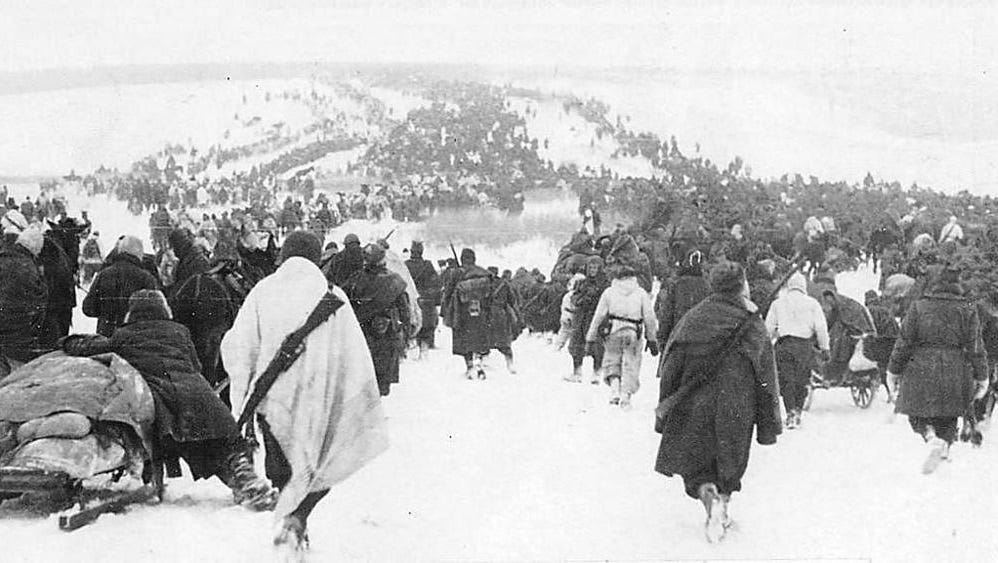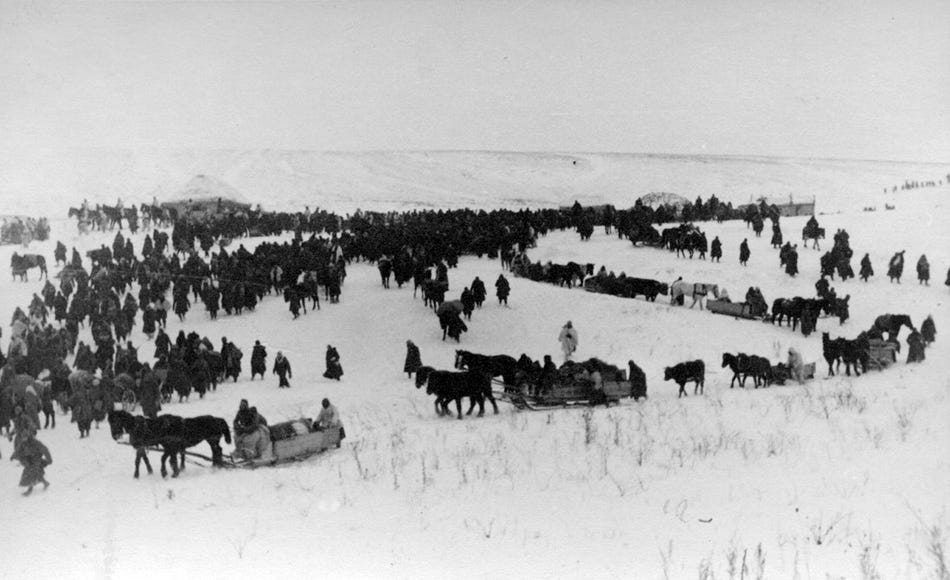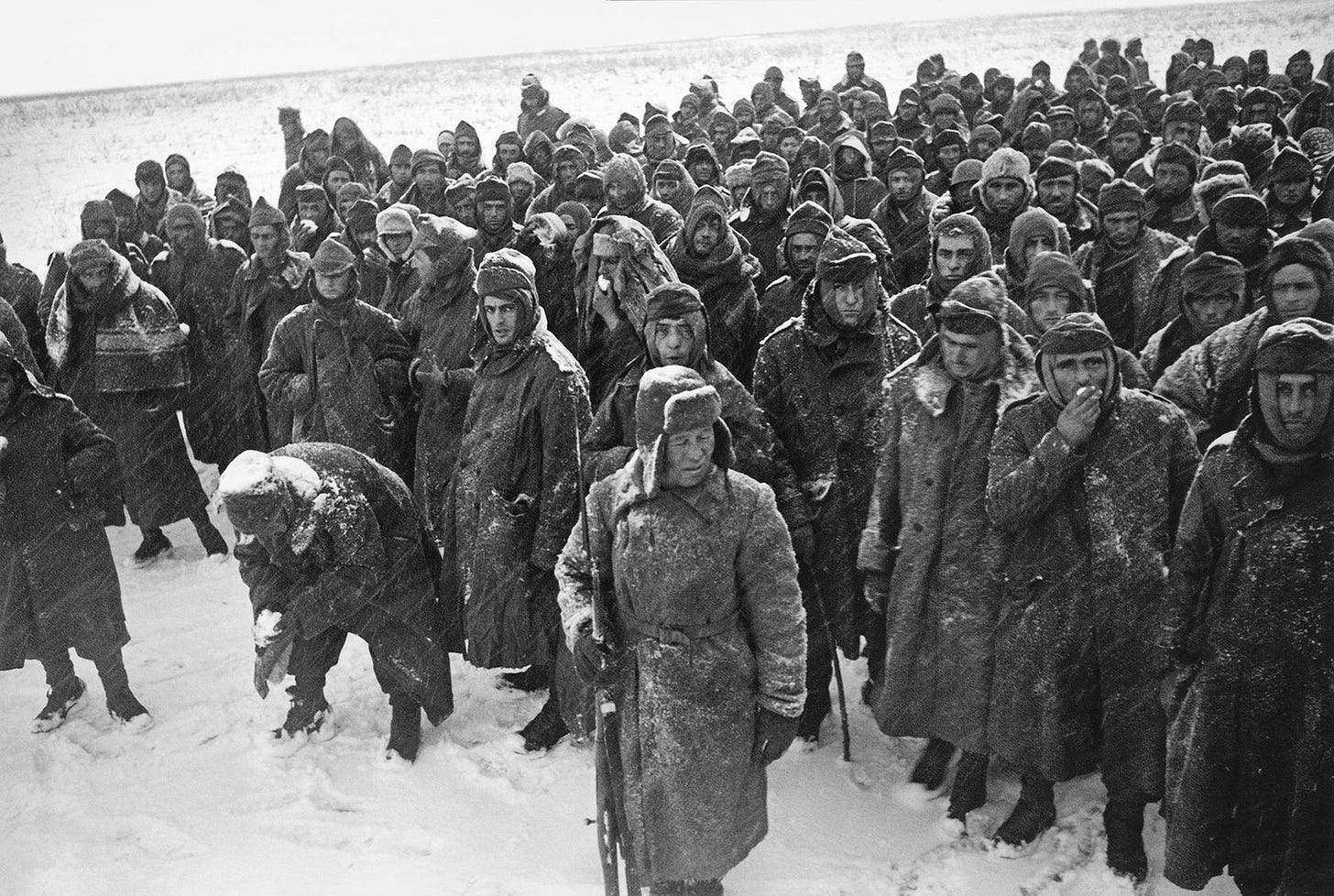The Italian retreat from Stalingrad
21st January 1943: Mussolini's's adventure on the Eastern front comes to a dismal end, as Italian troops make a desperate escape from Red Army encirclement


The Italian retreat from their positions outside Stalingrad continued. Around 130,000 had set off when their positions had been outflanked or overrun by the Red Army at the beginning of January. All along the way, they were harried by attacks from the Russians trying to cut them off.
There was no food, just what they carried or the scraps they could steal from the Russian peasants. There was no shelter apart from these peasant village houses.
Mario Rigoni Stern1 had been walking across the open steppe since 10th January when his strong point on the front line had been outflanked. He had celebrated a grim New Year's Day there - but that was now just a distant memory:
We pass another narrow deserted valley. We walk along it, anxiously; I feel as if I’m suffocating and wish we were out of it. I look everywhere apprehensively, listen and hold my breath. I’d like to run. At any moment I expect to see the turrets of tanks appear and hear bursts of machine-gun fire. But we pass through.
I'm hungry. When did I eat last? I don’t remember. The column passes between two villages a mile or so apart. There’s sure to be my something to eat there. Little groups detach themselves from our column and set off towards the villages in search of food. The officers shout at them, tell them there might be partisans or Red patrols there.
There’s nothing. No trees, no houses, just the snow and the stars and us.
Some soldiers from my platoon also go off in search of food. During a short halt we stop for a drink at a well and then I go off to what seems the nearest isba [Russian house]. But it’s one of the biggest and has already been visited by many others. All I find is a handful of of dried apples which the Russians use to make syrup.
We are still walking and night’s coming on. It’s cold; colder than ever, perhaps forty degrees. The breath freezes on our beards and moustaches; we walk on in silence with our blankets pulled up over our heads. We stop. There’s nothing. No trees, no houses, just the snow and the stars and us.
I fling myself down on the snow; and even the snow doesn’t seem to be there; I close my eyes on nothingness. Perhaps death will be like this, or perhaps I'm sleeping. I'm in a white cloud.
How many have thrown themselves down on the snow and never got up again?
But who’s calling me? Who’s shaking me so violently? Let me be. ‘Rigoni! Rigoni! Rigoni! Get up. The column’s left. Wake up. Rigoni.’
It’s Lieutenant Moscioni calling me anxiously, and I see him bending over me as I open my eyes. He gives me another couple of shakes and now I can see his face clearly, and his two dark eyes fixed on me, his beard hard and shiny with white frost, a blanket over his head,
‘Rigoni, take these,’ he says. And he gives me two little pills. ‘Swallow them, come along, make an effort.’ I get up, walk along with him and gradually we catch up with the company and I understand what’s happened . . .
How many have thrown themselves down on the snow and never got up again?Cenci and Moscioni make me mount a horse. But it’s worse than waking up; I’m frightened of getting frostbite, dismount and walk on.
Cenci gives me a cigarette and we smoke. ‘Say, Rigoni, what would you like most now?’ I smile, and they do too. They know the reply because I’ve said it at other times, walking along at night.
‘To get into a house, into a house like ours at home, take off all my clothes, be without boots, or pouches, without a blanket on my head; have a bath and put on a linen shirt, drink a cup of coffee, and then throw myself on to a bed, but a real bed with mattress sheets, a big bed in a warm room with an open fire; and then sleep and sleep and sleep; wake up, then, and hear the sound of bells and find a table laid; wine, spaghetti, fruit, grapes, cherries, figs; then go back to sleep and hear music.’
Cenci laughs, Antonelli laughs, and my companions also laugh.
Mario Rigoni Stern was one of the lucky ones, he returned to tell his tale.
Eugenio Corti2, an officer of the Pasubio Division, recalled more serious cases:
Exhausted men fell in the snow never to get up again.Some were going mad and did not understand they were dying. The most tenacious of the men continued to drag themselves along the road for a long time, until the strength of these unfortunates finally ran out.
The most frequent stories I heard were of mental confusion. I remember being taken aback by the story of someone who all of a sudden had burst out laughing, sat down in a snow drift, taken his boots off and set about burying his bare feet in the snow. After he had finished laughing, he loudly sang something very jolly. There were a great many similar cases.
There was to be no mercy if the Red Army caught them. Sergei Otroshchenkov3, a tank crewman of the 18th Tank Corps:
When the Italian forward units drew level with us, the order was sent along the (tank) columns: ‘Advance! Crush!’ We gave it to them from both flanks! I've never seen such carnage since. We literally smashed the Italian army into the ground…
I examined my tank - in one place there was a hand stuck to the tracks, in another a fragment of a skull.
It was winter and our tanks were whitewashed for winter camouflage. And when we withdrew from battle, our tanks were red below the turrets. It was as if we had been swimming in blood. I examined my tank - in one place there was a hand stuck to the tracks, in another a fragment of a skull.
From the Russian site: I Remember.



